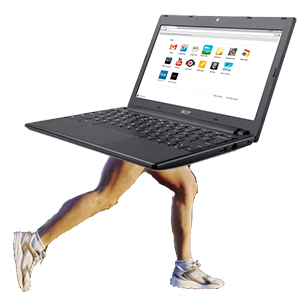New Chromebooks to get a much-needed Ivy Bridge speed boost?

I love Google's Chromebooks, especially in educational applications, where their long battery life, fast boot time, and interchangeability make them great "cloud clients." They are, however, fairly pokey, especially as tabs and windows start to proliferate as they are wont to do. The latest rumors, though, based on recent updates to related open source projects, suggests that a new generation of Chromebooks will feature Intel's snappy Sandy and Ivy Bridge chipsets.

Those web apps, which range from MMORPGs to photo and video editing to project management and productivity software, are the biggest reason that a speed boost would make Chromebooks competitive outside niche markets where a "Google Apps Client" is compelling. For users considering the netbook/notebook/tablet value proposition, better performance and a host of apps that beg for a keyboard could certainly tip the scales in favor of Google's notebooks.
Stephen Shankland wrote on CNET that
Thus, the prospect of a Sandy Bridge or Ivy Bridge machine intrigues me -- the faster graphics for hardware acceleration, for example. I'm not sure if it'll do a number on the current Chromebooks' impressive battery life, and it still will probably fall short for gaming, photo editing, video editing, and other tasks that right now aren't well suited to browser apps. But I'd take a faster Chromebook that I actually use over a slower one with better battery life that I don't use.
I'm willing to bet that a lot of people feel the same way, myself included. There's a reason I favor my MacBook Air over my aging Chromebook. That machine I leave for my wife who never has more than 5 tabs open and for whom checking our banking online or uploading a photo to Facebook is high-performance computing.